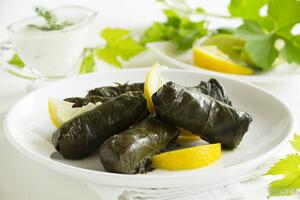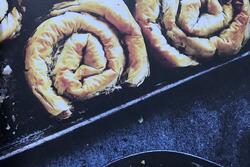On Rolling Grape Leaves
I.
Last spring break, I went to Las Vegas to visit my relatives. I remember rolling grape leaves in the kitchen with my aunt Lisa and my great aunt Margaret, our hands kneading into the table. We filled the leaves with meat and rice and stored them in a metal pot. Her husband, my uncle Dicky, who used to participate in the activity, had died maybe a decade earlier, but, the tradition of rolling the grape leaves lived on. After we finished, I took a bike ride—and felt free as I peddled. I rode down well-trodden paths and passed trees and pink and white flowers, signs of a young, blooming spring. Years earlier, we had planted a tree for my uncle Dicky, who died in Ithaca, New York, where my relatives used to live on Syrian Hill and my dad grew up and lived for thirty years. If trees give us air, they also continue to give us life.
Traditions live on in places and foods, which have the unique ability to root people in their heritage. But, my heritage is complicated. The same experiences that my relatives and ancestors hold close to their hearts aren’t as readily accessible to me. For instance, my family is of Syrian heritage. When my great aunt Margie was my age, she went to Syria. She traveled the world when women usually didn’t. At her home in Ithaca, she has drawers filled with jewelry from places all around the globe and a map with pins indicating every country she’s visited. Conditions have changed drastically in Syria; my family doesn't want me to travel there due to war, civil unrest, and terrorism. So while my aunt Margie was able to challenge gender norms in the 1950s in order to pursue international travel, I will most likely not visit Syria in my lifetime.
A four-hour drive from Ithaca, a robin leaves its nest and returns. I frequently visit my Jewish grandparents there—Bubbe and Poppie, who live in Chappaqua where everything is green, and it rains often. My grandmother is a communicator, and my grandfather is an artist. Bubbe bakes bread and has named her recipes after each of her grandchildren. Poppie sends the news clippings to each of us, always with a headline circled in purple marker. I grew up with lots of cousins on my mother’s side of the family, bar and bat mitzvahs, and a love for family and tradition.
But, years later—I have had to come to terms with the fact that certain parts of my Jewish and Syrian identity will be buried under a culture of denial and the pressure to assimilate. Last year, I took my grandparents to my college Hillel dinner at our Interfaith chapel. It poured buckets outside that weekend, but there was so much love and community in that room. My grandparents asked if all my Jewish friends went to Hillel, and I responded that not all of them did. They asked why. The normalization of anti-religious sentiment on college campuses, I mused. The polarization of the Israel-Palestinian conflict. The impossible nature of being a Jewish college student today. There is a generational divide; there is a religious divide; there is a divide. It wasn’t until I went to college that I recognized the complexity of my faith, that I understood why we fled for so many years.
II.
Throughout history, Jews fled from many countries due to discrimination, persecution, and genocide. Syrians also fled in search of a better life. The world industrialized, and so our political struggle became wedded to modernity. I feel most connected to my family history when I work my retail job. I’m here, folding clothes in a Target for minimum wage, and my relatives came here by boat from Syria and Italy so they could mine coal. I work so that I can pay tuition, and they worked so that they could carry themselves and their families into the future: this future.
Last winter break, I worked at a candy company. I packed perfectly wrapped chocolates, tossing the ones that were wrapped poorly to the side. Similar to the contrast between modernity and tradition, my packaging of candies into aesthetically pleasing boxes stood in contrast to the grape leaves I had rolled by hand months earlier. As I packaged candy, I passed the time by chatting with my coworkers and getting to know them. One of my coworkers didn’t understand how I was both Jewish and Christian. “I am the product of an interfaith marriage,” I explained. I talked about how religion is both spiritual and political. The marriage of two faiths is thus a political act, I said to him, as I packed and sealed the caramels into the bag.
Later, while driving home from the candy company, I realized that well-meaning people create binaries. Well-meaning people assume I am not connected to the Middle East. Well-meaning people tell me what my Judaism should mean to me. When I tell them I’m both Jewish and Christian, Syrian and American, they wrinkle up their faces, like their perception of me has been soiled. Even in progressive spaces, I find myself defending my right to the histories of my grandparents and great grandparents.
And as I drove down my city’s tired streets, I realized why I write. If place and food, along with tradition, have the power to root us—it is others’ interpretations of our lives that uproot us. I write to keep myself and my relatives alive. I write for my grandparents who traveled here by boat, sickened by salt and sea, who lived on Syrian Hill, who were Jewish and grew up poor. Every time I share that I’m Syrian and Jewish, I wait for the interrogation. I write because on the page, I can explain myself.
III.
My Jewish, Kosher friend visited me at college last month. He wanted to wash his hands in the house kitchen sink with prayer because it was Shabbat. When we went downstairs, him wearing a kippah, we were met with judging eyes, the flares of ostracization from judgemental housemates who view religion as antiquated. I kindly told him that we would figure out a solution. I filled a bowl with water and returned upstairs. The dark night became a curtain; it surrounded me in both pride and shame. There were tears in my eyes, and I felt close to God. I felt the sea salt in my eyes, the elevated sense of cultural grief.
Now that I am home and can process everything—that supermarkets are left bare, that there are no community gatherings for the time being—my spirituality and religion have taken on a new meaning. The world as we knew it is gone forever, changing rapidly in response to the pandemic. Weeks since my friend’s visit, I am sitting inside doing virtual cantations while social distancing. I miss the synagogue. I yearn to roll the grape leaves, filling each one with rice and meat as they fill the metal pot. In the midst of civil unrest in Syria and the rise of antisemitism around the world, I have come to realize that my story is complicated. This story is further complicated by the Jewish-Arab binary: the idea that Jewish and Arab narrative is antithetical to one another, that these groups will continue to hate each other, that these identities can never overlap.
But when I roll the grape leaves with my relatives, I am reminded that I have been given the power to defy it. The truth is in the palms of my hands.








Good stuff Maddie! I thank my lucky stars everyday I married into this amazing family. Keep up the good work. Can’t wait for more.
Uncle Todd
we did this once. appreciate Moti's Market